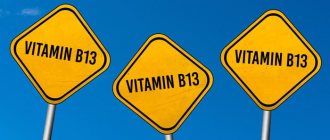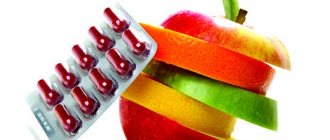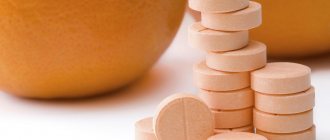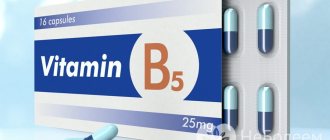Biotin, also known as vitamin B7, is a water-soluble vitamin belonging to group B - substances necessary for metabolism, nervous, cardiovascular and digestive systems.
Biotin acts in the body as a coenzyme necessary for the metabolism of saturated fats, amino acids and glucose. This means that when we eat foods rich in fats, protein and carbohydrates, we need vitamin B7 in order to convert macronutrients into energy.
It is believed that biotin can maintain youthful skin, improve the appearance of hair, and accelerate nail growth. The vitamin definitely plays a significant role in the metabolism of substances and affects the condition of the human body.
Biotin is sometimes called vitamin H from the German words “Haar” and “Haut”, which translate as “hair” and “skin”.
Biotin is often added to cosmetic products intended for skin and hair, even despite the popular opinion that vitamin molecules are too large and are not absorbed by the skin.
Vitamin B7 can be obtained from foods such as meat, eggs, avocados, fish, mushrooms and wild berries.
Beneficial properties of biotin:
- Supports Healthy Metabolism
- Helps blood sugar balance
- Improves the condition of nails, hair and skin
- Helps brain function and reduces cognitive dysfunction
- Helps maintain a healthy cardiovascular system
- Forms tissues and muscles
Table. Biotin content per 100 grams of product
| Product | Biotin content (mcg) | Daily consumption rate, % |
| Chicken liver | 170 | 340 |
| Chicken egg yolk | 56 | 112 |
| Beef and pork liver | 40 | 80 |
| Chicken egg, oatmeal (any), peas | 15-20 | 30-40 |
| Rice, barley and wheat porridge, chicken, cod | 10-12 | 20-25 |
| Meat (broiler chickens), cottage cheese of any fat content, salmon, corn porridge, soft cheese (such as Camembert and Brie) | 5,1-8,4 | 10-17% |
Beneficial properties of biotin
Supports Healthy Metabolism
Biotin regulates the synthesis of genes that are critical for metabolic functions.
Vitamin B7, along with other B vitamins, is essential for converting the food you eat into usable energy, which supports a healthy metabolism. Vitamin B7 does this in several ways:
- Converts glucose from a carbohydrate and sugar source into a usable "fuel" that is the body's preferred source of energy.
- Helps the body use amino acids from proteins for certain body functions.
- Activates fatty acids from fat-containing foods such as butter or animal fat.
Normal, healthy metabolic activity occurs only after the body can use macronutrients from food for energy. Vitamin B7 also improves metabolism and glucose utilization, which is extremely beneficial in modern times where cases of type 2 diabetes are very common.
Without enough vitamin B7 present in the body, symptoms of a weak metabolism can include: low energy levels, fatigue, weight gain, digestive problems, possible development of diabetes, changes in appetite, low mood and more.
May improve glucose intolerance and help balance blood sugar levels
Vitamin B7/biotin, especially when combined with chromium, has been shown to help lower blood sugar levels in people with diabetes. This is especially true for those who have blood glucose (sugar) levels that are not controlled with prescription medications.
Biotin increases blood glucose levels because it promotes the activity of insulin, which is an essential hormone needed to return blood sugar levels to a balanced state. Better insulin response helps reduce the risk of significant changes in blood sugar levels, which can lead to prediabetes, type 2 diabetes, weight gain and forms of metabolic syndrome.
Biotin reduces the expression of enzymes that stimulate glucose production in the liver, so less sugar enters the blood. For this reason, vitamin B7 deficiency has been associated with impaired glucose tolerance and decreased glucose utilization. Vitamin B7 may also help reduce the symptoms of existing cases of diabetes.
Supports healthy hair, skin and nails
Vitamin B7 is essential for maintaining healthy skin, hair and nails, so when someone becomes deficient in Vitamin B7, symptoms may include thinning, splitting and brittle hair or dermatitis, i.e. dry, irritated skin. You may notice that biotin is included in many facial creams, hair masks and other beauty products for this reason, but it is much more effective when taken orally rather than topically.
According to research, taking high doses of biotin can help treat weak hair and nails. In fact, this benefit of vitamin B7 was first discovered when horses started having problems with their hooves becoming brittle and brittle. Then doses of biotin radically corrected the whole situation.
You can read more about hair health here: 10 ways to make your hair grow faster using home remedies
Other benefits of biotin include protecting skin from acne, fungal infections, rashes, and severe dryness and cracking.
Protects brain function and combats cognitive decline
Biotin benefits nervous system health due to its role in nerve signaling and neurotransmitter activity. B vitamins work together to influence memory function and protect against age-related cognitive decline, such as neurodegenerative disorders such as Alzheimer's disease or dementia.
Because of their role in the synthesis of hormones associated with mood regulation, B vitamins, such as vitamin B7, help support positive thinking, promote energy boosts, and improve concentration.
Helps support cardiovascular health
B vitamins, particularly vitamin B7, play a role in protecting against common heart diseases, including inflammation, atherosclerosis (or the buildup of plaque in the arteries), heart attacks and stroke.
Research suggests that vitamin B7 and chromium may have an effect and help improve cholesterol levels that other vitamin groups cannot. Vitamin B7 has been shown to have positive results in increasing "good" HDL cholesterol while helping to reduce "bad" LDL cholesterol. This is especially true for people with diabetes, who are at risk for heart disease.
Supports healthy thyroid and adrenal function
B vitamins, in our case vitamin B7/biotin, are essential for proper thyroid activity and protection against adrenal fatigue. The thyroid and adrenal glands are the “master” glands that are responsible for multiple states of the body, including hunger, sleep, pain perception, mood and energy.
A deficiency of B vitamins can lead to complications with the thyroid and adrenal glands - and thus create a variety of negative symptoms, such as fatigue, weight gain or sudden weight loss, sleep problems and much more.
Helps repair and build tissue and muscle
Biotin benefits include helping with tissue growth and maintenance, including muscle repair and building. When tissue or muscle breaks down, B vitamins, namely B7, are used to restore the strength of the muscles and tissues, which leads to their growth.
B vitamins also help reduce inflammation, which can lead to muscle or joint pain. Even more seriously, deficiency of vitamin B7 and other B vitamins can slow growth and lead to abnormal development of fetuses in the womb. This is one of the reasons why supplementing with vitamin B7/biotin and all other B vitamins is crucial during pregnancy.
Children's share
A special situation with regard to biotin is a congenital deficiency of the enzyme biotinidase. It can be detected through newborn screening, but this is not done on a large scale in our country. Testing is usually done on a random basis and usually in suspected cases where the child has symptoms that may be related to the disease. As a rule, these are seizures, decreased hearing and vision and other signs of damage to the nervous system, as well as skin problems and hair loss or lack of hair (alopecia), and frequent infections. Among such children, enzyme deficiency was detected with a frequency of 1: 1000. That is, this disease is not so common; among all newborns, it occurs in one child out of 20-40 thousand. When should you consider testing for biotinidase deficiency? Most often, this condition begins to manifest itself with seizures, which do not go away when specific medications are prescribed. And with the addition of biotin, everything returns to normal. You need to take medications with vitamin B7 for life.
Usually the diagnosis is made between the ages of 1 month and 6 months. But it is best to do this immediately after birth or in the first month of life. If biotin treatment is started at this age, mental retardation can be prevented. If later, skin and hair problems will go away, but neurological changes may remain. By the way, the World Health Organization recommends including a test for biotinidase deficiency in newborn screening.
Biotin deficiency overshadows all its benefits
Vitamin B7/biotin deficiency is rare in countries where people generally consume sufficient calories and food in general. This is mainly due to three reasons: the recommended daily allowances per day are relatively low; many common products contain biotin; and researchers believe that our gut digestive bacteria have the ability to produce biotin on their own.
So what causes biotin deficiency? Biotin is water soluble, meaning that it travels through the bloodstream and any excess or unused amounts of this vitamin present in the body are eliminated through urine. Therefore, the body does not build up biotin reserves, and it is very difficult to overdo it. However, this also means that you should consume a small amount of vitamin B7 every day to keep your body healthy.
As explained in a key study on biotin by Dr. Janos Zempleny et al., only three proteins are important for the correct amount of biotin in the body (a process called homeostasis). These proteins are biotinidase, sodium-dependent multivitamin transporter (SMVT), and holocarboxylase synthetase (HCS). They work together to ensure that biotin is separated from the foods we eat and then digested in the gastrointestinal system. Several other proteins can sometimes interfere with this process, including avidin, which is found in raw egg whites.
Increased risk factors for vitamin B7/biotin deficiency:
- pregnancy
- long-term use of certain birth control medications
- excessive alcohol consumption
- consuming large amounts of raw egg whites
- smoking
- long-term use of antibiotics
- intestinal malabsorption problems or serious digestive disorders such as Crohn's disease, celiac disease, or leaky gut syndrome
Symptoms of biotin deficiency:
- dry, irritated skin
- brittle hair/hair loss
- lack of energy/chronic fatigue
- digestive and intestinal problems
- muscle pain
- mood changes
- convulsions
- tingling in the limbs
- cognitive impairment
Cautions and possible harm
The intake of biotin along with food does not pose any danger to the body. Natural vitamin B7 is a water-soluble compound, excess of which is easily excreted in the urine. An overdose of biotin is almost impossible.
Too high a concentration of biotin in the blood is manifested by the sudden appearance of an unusual rash on the skin. In this case, you should consult a doctor. If an overdose of biotin is suspected, a series of tests are prescribed to determine the levels of vitamin C and B6 in the blood. At the same time, the glucose level and the concentration of insulin produced are assessed. If an overdose of biotin is confirmed, its daily dose is reduced. It is important to remember that the daily dosage of biotin for an adult is 50 mcg, for a child - 10-20 mcg.
Currently, the pharmacy chain offers a huge number of drugs containing biotin. They are positioned as products that improve the quality and health of hair, nails and skin. Most of the dietary supplements presented contain prohibitive doses of biotin - up to 10,000 mcg, which exceeds the recommended daily dosage by up to 200 times.
Excessive intake of biotin causes inhibition of the production of troponin, a protein that signals sudden myocardial infarction. Under the influence of biotin, troponin is not detected in the blood, which misleads cardiologists. As a result, the patient dies from an incorrect diagnosis. If you have pain in the heart area, be sure to inform your doctor about taking biotin to avoid an erroneous conclusion.
When choosing a vitamin complex, pay attention to the biotin content in it! Excessive doses of vitamin B7 are dangerous due to complications and do not have a pronounced therapeutic effect.
Biotin for multiple sclerosis
Multiple sclerosis is associated with impaired formation of the myelin sheath of nerve cells. Since myelin synthesis requires fats, the product also takes part in this process. It is involved in the absorption of vitamin B12, vital for the nervous system. It is used as an adjunct that slows down negative processes, maintains good health, allows you to remain productive longer, and avoid problems with sleep and memory. Before taking biotin, you should consult your doctor - the dosage is selected individually, based on the needs of the body.
Main signs of biotin deficiency
Biotin deficiency is a rare condition; a healthy person can easily avoid vitamin deficiency. A deficiency can develop due to gross non-compliance with the rules of a healthy diet, malnutrition, severe pathologies that interfere with the absorption of nutrients. If the need has increased (pregnancy, burns, alcoholism), but the supply remains the same, there is also a risk of deficiency. Symptoms are varied:
- Hair loss;
- Rash (red, scaly, mainly on the face);
- Decreased appetite;
- Muscle pain;
- Sleep disorders;
- Depression;
- In patients with diabetes mellitus – increased glycemic levels.
If such symptoms appear, you need to undergo examination.
Interaction of biotin with other drugs
The most well-known substance with which the medicine should not be taken is Avadin. Both compounds are found in eggs, vitamin B7 in the yolk, Avadin in the white. When mixed, they react with each other, bind, and the resulting compound is not absorbed by humans. To avoid the influence of Avadin, you can use only the yolk or heat treatment (Avadin is destroyed at high temperatures).
The combination with folic acid has a beneficial effect on the action of both vitamins. The complexes contain both substances. Fatty acids - omega-3, omega-6, are better absorbed with a sufficient level of biotin in the body. But if fats are exposed to water or air, the absorption of vitamin H becomes more difficult. Taking balanced vitamin complexes and proper cooking helps to avoid this.
Vitamin preparations with biotin are compatible with zinc, magnesium, and calcium. They are part of the same drugs. The absorption of iron and iodine is enhanced, and an excess of microelements is possible. The correct selection of the complex on the advice of a doctor copes with the problem.
Alcohol increases the need for biotin.
Biotin is a versatile substance, the need for which is met without additional effort. Deficiency or excess is associated with gross pathologies and extreme disregard for healthy eating recommendations, unhealthy diets, and bad habits.
What does a woman’s body need?
The most noticeable area of application of this compound for the fair sex is the condition of nails, skin and hair. The vitamin regulates the absorption of vitamins A and E, important for youth and beauty, and is involved in fat metabolism. A sufficient amount of biotin, even without strict diet, maintains clear skin, healthy shiny hair, and smooth nails. Additional doses are useful for acne, dysfunction of the sebaceous glands, brittle nails, and for hair restoration after traumatic procedures.
The second area is the effect on the synthesis of steroid hormones (which includes progesterone, the hormone of the second phase of the cycle). Their synthesis requires fats, in the metabolism of which biotin is involved. The substance helps maintain a normal menstrual cycle, increases the likelihood of conception, and the readiness of the endometrium to accept the fertilized egg.
Sources of Vitamin H (Biotin)
Vitamin B7 was first discovered in yeast. Afterwards, a high content of animal origin in food was revealed. Most people easily get their daily requirement of the vitamin without much dietary control. If there is not enough biotin, its supply is compensated by nutritional supplements and vitamin complexes.
Foods containing vitamin H (biotin)
Biotin is found in animal products. The main source is beef, pork and chicken liver - a reservoir of B vitamins in the body. Other meat products contain less of the compound, but are still enough to meet the daily requirement. The second highest vitamin content is egg yolk, followed by dairy products and red fish. Among plant foods, the leaders in biotin content are yeast, nuts and seeds, followed by sweet potatoes and avocados. The vitamin is found in small quantities in all foods consumed.
Biotin in food (table)
| Product | Contents per 100g | Share of daily requirement |
| Beef liver | 200mg | Fully |
| Pork liver | 250mg | Fully |
| Pork | 2-75mg | ½-1/4 |
| Beef | 5mg | Less than 5% |
| Egg yolk | 30mg | 1/5-1/10 |
| Whole egg | 9mg | Less than 5% |
| Cow's milk | 5mg | Less than 5% |
| Condensed milk | 15mg | 1/10-1/30 |
| Human milk | 0.1 mg | Less than 5% |
| Salmon | 5-10mg | Less than 10% |
| Herring | 4mg | Less than 5% |
| Tuna | 4mg | Less than 5% |
| Peanut | 40mg | 10-20% |
| Potato | 0.5-1mg | Less than 5% |
| White cabbage | 24mg | 1/3-1/6 |
| Cauliflower | 17mg | Less than 10% |
| Beet | 2mg | Less than 5% |
| Tomatoes | 4mg | Less than 5% |
| Carrot | 2.5 mg | Less than 5% |
| Bulb onions | 28mg | 1/5-1/10 |
| Apples | 9mg | Less than 5% |
| Oranges | 2mg | Less than 5% |
| Peaches | 1.7 mg | Less than 5% |
| Melon | 3mg | Less than 5% |
| Strawberries | 4mg | Less than 5% |
| Wheat flour | 1mg | Less than 5% |
| Bread | 2-5mg | Less than 5% |
| Rice | 12mg | Less than 10% |
| Rice bran | 46mg | 1/3-1/6 |
| Corn | 6mg | Less than 5% |
| Barley | 6mg | Less than 5% |
Daily requirement for vitamin B7
The daily dose is 150-300 mg. for adults. Differences are due to gender, age, type of activity:
- For people of mental work of any gender - the lower limit of the norm;
- For women doing physical work – 200 mg.
- For men doing physical work – 250 mg;
- For pregnant women - the upper limit or higher.
Biotin and healthy diets
The recommendations of all significant experts in the field of health and healthy nutrition boil down to the fact that all substances necessary for the normal functioning of the body should be obtained from food. To do this, you need to carefully monitor what you eat, know the benefits of certain substances, and know where they can be found. With the right diet, a person can easily give his body everything it needs. Almost all nutrients, including vitamins, minerals and fiber, can be obtained from food. It is also necessary to remember to limit the levels of harmful substances that can also enter our body through food intake, such as salt, sugar and trans fats.
329, today 1
Best Biotin Producers
If you decide to take additional vitamin B7 as a dietary supplement, we recommend looking at ]Natrol[/anchor]. This company is one of the discoverers of biotin and is rightfully considered a leading manufacturer.
An excellent solution is offered by Country Life, which uses biotin as the basis of its main best-selling Maxi-Hair complex.
Affordable analogues are offered by Now Foods and Doctor's Best. And in the premium segment of nutritional supplements, Solgar dominates.
Summarize
- Biotin is a water-soluble B vitamin that your body must get from food. Deficiency is rare and can be avoided by eating biotin-rich foods.
- Some of the best sources of biotin are legumes, egg yolks, organ meats, nuts, seeds, mushrooms, avocados, sweet potatoes and yeast.
- Biotin supplements are also available commercially, but most people can get all the biotin they need by eating a balanced diet.
Tags: Biotin
- Related Posts
- 13 Best Protein Sources for Vegetarians and Vegans
- Is it possible to drink coffee in the morning on an empty stomach?
- Can you eat banana peels?
« Previous entry
Basic functions in the body
Biotin belongs to a large group of water-soluble B vitamins. It was discovered in the first half of the 20th century during experiments with rodents.
This is interesting:
Biotin is resistant to sunlight and is destroyed by boiling.
Biotin is involved in a number of important chemical reactions in the body, for example:
- it is a component of enzymes that regulate protein balance;
- necessary for the production of the enzyme glucokinase, without which glycolysis, that is, the processing of glucose, does not occur;
- the role of B7 in the metabolism of glucose is high, maintaining its normal level in the blood;
- biotin is needed for the formation and accumulation of carbohydrates in the liver, in particular glycogen, which is the body’s energy reserve;
- without it, normal fat metabolism, in particular the decomposition of fatty acids, is impossible;
- biotin takes part in the formation of hemoglobin, without which the exchange of oxygen and carbon dioxide does not occur;
- sulfur, which is part of B7, is needed for the production of collagen, which is the basis of skin, hair and nails.
Using biotin preparations, you can improve glucose metabolism in diabetics, restore hair structure, stop hair loss, and cure some skin diseases.
Daily requirement
As a rule, the human body needs very little of this substance, but its regular supply is important.
It is enough for adults to take from 50 mcg of B7 per day, for children – from 10 to 50 mcg (the dose depends on the age of the child).
In pregnant and breastfeeding women, the need for biotin increases to 60 mcg per day.
People who eat a normal and varied diet get the required daily amount of biotin from their diet.
In addition, the body itself synthesizes quite a lot of it - the intestinal microflora is responsible for this. But this only happens if the intestines are healthy and populated with beneficial microorganisms.
Excess vitamin B7 and health risks.
To date, no side effects have been identified from the use of large doses of biotin. Some studies have found no harm from taking 10 to 50 mg/day to 200 mg/day of oral biotin, or 20 mg/day of intravenous biotin. These studies were conducted in people with biotinidase deficiency. However, high levels of biotin may pose another type of risk to human health. In addition to taking biotin beyond recommended levels, depending on the test, abnormalities in significant clinical parameters may occur. As a result, these incorrect indicators may lead to your doctor making an incorrect diagnosis and prescribing incorrect treatment.











